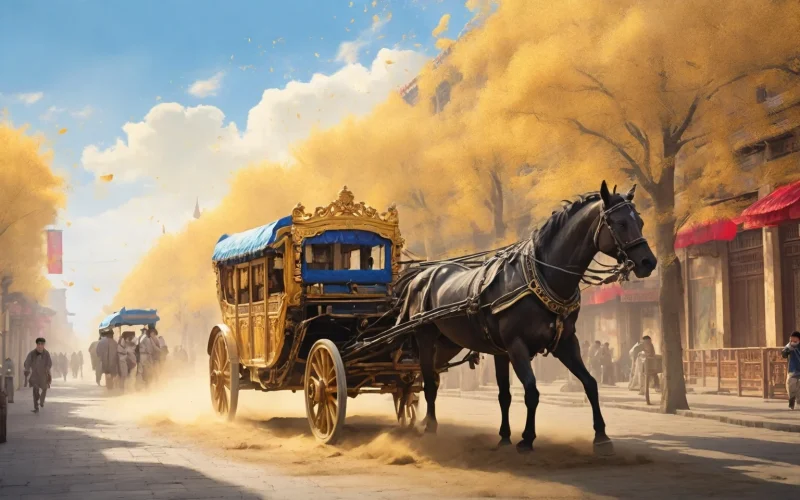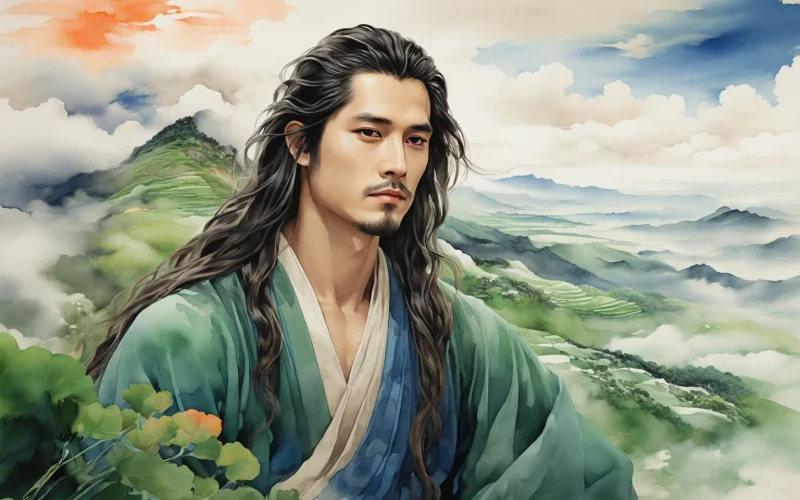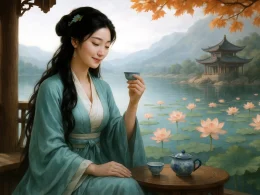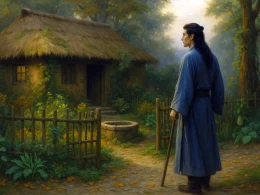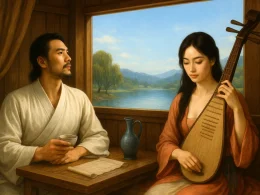The dust which eunuchs' carriages raise
Darkens at noon the public ways.
Of their gold the eunuchs are proud;
Their mansions rise to scrape the cloud
I meet those who can make cocks fight,
With caps and cabs, so fair and bright.
Into rainbows they blow their breath,
Passers-by are frightened to death.
There is no connoisseur in this age.
Who can tell a thief from a sage?
Original Poem:
「古风 · 其二十四」
李白
大车扬飞尘,亭午暗阡陌。
中贵多黄金,连云开甲宅。
路逢斗鸡者,冠盖何辉赫。
鼻息干虹蜺,行人皆怵惕。
世无洗耳翁,谁知尧与跖。
Interpretation:
This poem was written by Li Bai during the reign of Emperor Xuanzong, a time when the influence of eunuchs and the popularity of cockfighting were widespread in the court. Set in Chang'an, the poem criticizes the corrupt political atmosphere and the moral decay of society, particularly targeting the eunuchs and the powerbrokers who indulged in cockfighting. The poem was likely written around the eighteenth year of the Kaiyuan era (730), reflecting Li Bai's deep insight and criticism of the social issues of his time.
First Couplet: “大车扬飞尘,亭午暗阡陌。”
(The large carriage kicks up flying dust, and the roads are dark at midday.)
These lines depict the dust raised by the large carriages, symbolizing the turbulence and corruption of society. The dust clouds not only obscure the sunlight but also suggest the power and extravagance of the eunuchs, which darken the capital. The strong visual imagery highlights the decaying atmosphere of the time.
Second Couplet: “中贵多黄金,连云开甲宅。”
(The eunuchs amass gold, and their mansions rise like clouds.)
This couplet reveals how the eunuchs use their power to accumulate immense wealth, building extravagant homes. The imagery of “gold” and “mansions” further criticizes their corruption and luxurious lifestyle, representing their towering arrogance, which symbolizes the rampant corrupt practices of the time.
Third Couplet: “路逢斗鸡者,冠盖何辉赫。”
(On the road, I encounter cockfighters, their crowns and hats shining brightly.)
These lines describe the cockfighters with their majestic headgear, emphasizing how such lowly entertainment elevates their social standing. Li Bai uses this contrast to satirize the moral corruption and vanity of society, pointing out how even trivial pursuits grant some individuals undeserved fame and status, highlighting the pathological state of society.
Fourth Couplet: “鼻息干虹蜺,行人皆怵惕。”
(Their breath is like a rainbow in the air, and passersby are filled with fear.)
Through the description of their breath like a rainbow, Li Bai emphasizes the arrogance and intimidation of the cockfighters, even causing fear among passersby. This not only portrays the cockfighters' domineering attitude but also symbolizes the moral decay in society, creating an atmosphere of oppressive power.
Fifth Couplet: “世无洗耳翁,谁知尧与跖。”
(There is no longer a noble figure like the Washing-Ear Elder, who can distinguish between Yao and Zhi.)
In these lines, Li Bai alludes to the story of the Washing-Ear Elder, a figure from ancient times known for his purity and refusal to seek fame. The poet laments the absence of such high-minded figures in his own time, pointing out the displacement of moral values. The reference to Yao and Zhi underscores the confusion between virtuous and depraved leaders, reflecting the corruption of the era.
Writing Characteristics:
- Sharp Satire: Through detailed descriptions and vivid contrasts, the poet uses lively metaphors to sharply criticize the eunuchs and cockfighters, exposing their absurdities and corruption.
- Progressive Narrative: Starting with the luxury of the eunuchs and moving to the arrogance of the cockfighters, the poet gradually intensifies his criticism of the social decay, adding layers to the poem's critique.
- Historical Reference and Insight: By invoking the story of the Washing-Ear Elder, the poet not only highlights the noble qualities of ancient sages but also critiques the moral decline and value displacement in contemporary society, offering a deep reflection on the social order.
Overall Analysis:
This poem critiques two distinct groups in society—the eunuchs and the cockfighters—unveiling the corruption fostered by Emperor Xuanzong's favoring of powerful officials. With sharp, ironic language and vivid metaphors, Li Bai exposes the arrogance and degradation of these figures, expressing his disillusionment with the political power of the time. The final lines, referencing the ancient sage Xu You, further deepen the poem's theme, expressing a profound sense of moral disintegration and societal chaos.
Insights:
This poem serves as a reminder that, under the influence of power and wealth, societies can easily fall into corruption and decadence. In such times, superficial pursuits and the vanity of the elite overshadow true virtue and moral integrity. By contrasting figures from ancient and contemporary times, Li Bai warns against getting lost in the fog of power and profit, urging society to uphold justice and righteousness in order to foster progress and clarity.
Poem translator:
Xu Yuan-chong(许渊冲)
About the poet

Li Bai (李白), 701 - 762 A.D., whose ancestral home was in Gansu, was preceded by Li Guang, a general of the Han Dynasty. Tang poetry is one of the brightest constellations in the history of Chinese literature, and one of the brightest stars is Li Bai.






